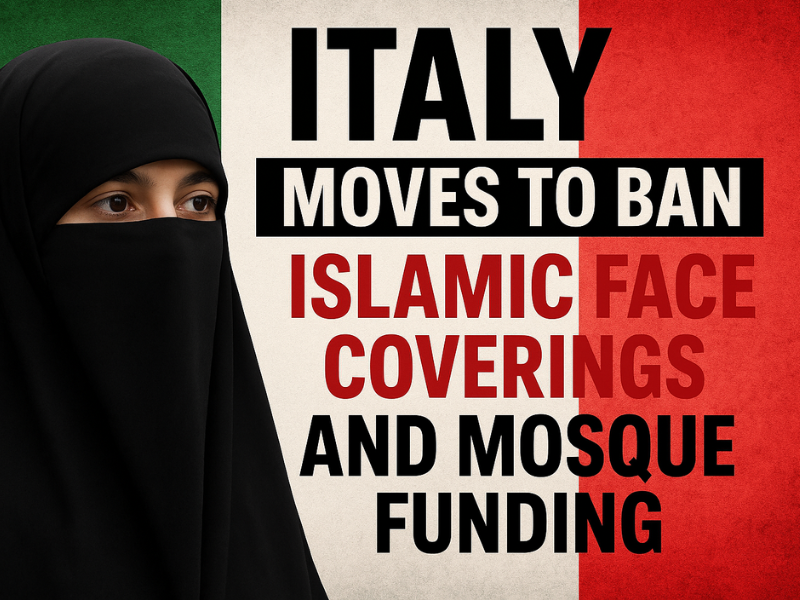Italy Moves to Ban Islamic Face Coverings and Mosque Funding: Full Details 2025
Italy plans to ban Islamic face coverings like the burqa and niqab, and introduce strict rules on mosque funding. Learn why this proposal is sparking national debate and how it could reshape religious freedom in Italy.
Overview: Italy’s New Proposal on Islamic Practices
In 2025, the Italian government led by Prime Minister Giorgia Meloni and the Brothers of Italy party introduced a new legislative proposal aimed at banning Islamic face coverings and monitoring mosque funding.
The move, presented as part of a national security and integration strategy, has ignited widespread debate about religious freedom, women’s rights, and secularism in Europe.
The proposal is expected to be discussed in Parliament later this year, with strong support from right-wing lawmakers and resistance from liberal and Muslim organizations.
What the Proposed Law Says
1. Ban on Islamic Face Coverings
Under the proposed law, full-face veils such as the burqa and niqab would be prohibited in public spaces, including:
-
Schools and universities
-
Government buildings
-
Shops and public transport
Anyone found wearing such coverings could face fines between €300 and €3,000.
Supporters argue the ban promotes social integration and public safety, while critics say it violates personal and religious rights.
2. Regulation of Mosque Funding
The bill would also enforce strict financial transparency for religious organizations.
Mosques and Islamic associations would be required to disclose their sources of income, especially foreign donations.
The government could block or restrict funding that it considers a threat to national security or democratic values.
3. Additional Social Measures
The proposal also includes:
-
Tougher penalties for forced or underage marriages
-
A ban on virginity testing, often associated with cultural or religious practices
These measures are meant to protect women’s rights and align religious customs with Italian constitutional values.
Why the Government Supports the Bill
The ruling coalition argues the new legislation is essential to:
-
Preserve Italy’s secular identity
-
Combat religious extremism
-
Promote integration among immigrant communities
-
Ensure transparency in religious institutions
Supporters say the bill is not anti-Islamic but aims to apply the same transparency rules to all religions operating within Italy.
Why Critics Oppose the Ban
Opponents — including human rights groups, Muslim leaders, and European civil society organizations — see the proposal as discriminatory and unconstitutional.
They argue it:
-
Violates freedom of religion and expression
-
Targets Muslim women, making them more vulnerable to social exclusion
-
Could fuel Islamophobia and harm Italy’s image internationally
Some critics also warn that the bill might conflict with EU human rights laws, leading to potential legal challenges at the European Court of Human Rights.
Legal Context: Italy and European Precedents
Italy already has an existing 1975 anti-mask law, which forbids wearing face coverings in public for security reasons. However, religious exceptions have been tolerated in the past.
If this new proposal becomes law, Italy would join other European nations — such as France, Belgium, Austria, and Denmark — that have banned Islamic full-face veils in public spaces.
Potential Impacts on Italian Society
-
On Muslim Communities:
Many Muslims in Italy worry that the ban could deepen social divisions and make religious expression more difficult. -
On Women’s Rights:
Supporters argue it protects women from coercion, while opponents believe it restricts women’s freedom of choice. -
On Italy’s Global Image:
The proposal could strain relations with Muslim-majority countries and international human rights organizations.
What Happens Next?
The bill is now under parliamentary review and could face amendments before a final vote.
If passed, it will represent a significant shift in Italy’s religious policy, shaping how freedom of faith is practiced in one of Europe’s most Catholic-majority countries.
A Divisive Step Toward Secularism or Restriction of Freedom?
Italy’s move to ban Islamic face coverings and regulate mosque funding reflects a broader European debate on identity, integration, and security.
Whether viewed as a necessary protection of national values or a violation of personal liberty, this proposal will have lasting consequences for Italy’s multicultural future.
